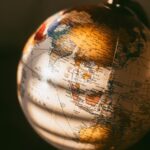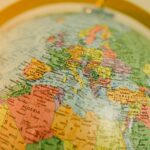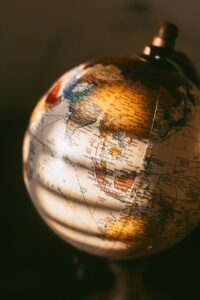Sacred Geography, Scriptural Silence, and Historical Qualms. Revisionism and the Politics of Denial
By Bedouin Report
There is a verse in the Quran that does not whisper but speaks boldly to those who will listen. It reads:
“O my people! Enter the Holy Land which Allah has assigned to you and do not turn back and become losers.” (Quran 5:21)
With this command, Allah affirms what many today refuse to admit: that the Holy Land was divinely designated for the Children of Israel. That assignment, rooted not in race but in covenant, was not conditional on contemporary politics but transcendent in its origin. Though the Children of Israel refused to enter the land in that moment, fearful of the fierce people who inhabited it, and punished for their disobedience, the divine command itself was never rescinded.
The Quran never revoked their right to the land. On the contrary, it calls it a “blessed” land, and one “assigned” to them. The truth, as written, contradicts the selective memory of many modern leaders and imams who continue to stir political fire in the hearts of the people while remaining silent about the divine guidance found in the very Book they preach.
The theological understanding of divine chosenness in Islam is neither tribal nor ethnic, it is moral and conditional. Chosenness in Islam is not a permanent ethnic status but a trust bestowed upon those who uphold righteousness and divine commandments.¹ In the Quran, nobility is determined not by ancestry, but by piety:
“Indeed, the most noble of you in the sight of Allah is the most righteous of you.” (Quran 49:13)
The Children of Israel were chosen because they were given prophets and scriptures. Their fall from grace was due to disobedience and deviation, not a revocation of their historic place in the divine narrative.² The land remained promised, its sanctity untouched by human transgression.
When Truth Becomes a Scandal: Sacred Geography and the Realpolitik of North and West Africa
From the spiritual gravitas of Morocco’s ancient religious institutions to Mauritania’s deep Quran heritage, from Algeria’s anti-colonial Islamic scholarship to Senegal’s vibrant Sufi tradition, North and West Africa comprise one of the most devout, intellectually rich corridors in the Muslim world. In these societies, Islam is not just a private faith, it is a public force. It shapes identity, anchors governance, and influences foreign policy. Reverence for Mecca is not only a matter of theological adherence but a symbol of civilizational belonging, rooted in centuries of pilgrimage, trade, and sacred lineage.
Yet alongside this deep-rooted connection to Mecca lies a fierce generational solidarity with the Palestinian cause. Particularly in the western Sahel, support for Palestine is a shared cultural reflex, forged in the crucible of anti-colonial resistance, post-independence identity, and a regional aversion to global double standards. To support Palestine in this context is to stand for the oppressed. It is to uphold Quran justice, to assert moral clarity, and to reject foreign dominance, be it military, economic, or narrative.
This powerful convergence of sacred geography and political identity is what makes the 2018 controversy surrounding Senegalese politician Idrissa Seck so significant. In a public address, Seck drew upon Quran language to suggest that the true site of pilgrimage referenced in the Quran, Bakkah, not Makkah, may in fact be Jerusalem, not the city known today as Mecca. Though he stopped short of stating it outright, the implication sent shockwaves through Senegalese society, a nation deeply shaped by Islamic values and long committed to the Palestinian cause.
The reaction was swift and visceral. Religious leaders, scholars, politicians, and everyday citizens condemned his remarks as blasphemous and subversive. Many accused him of parroting Zionist rhetoric, of betraying the Palestinian cause, and of undermining Senegal’s religious credibility. Mamadou Bamba Ndiaye, the country’s former Minister of Religious Affairs, publicly rebuked Seck, citing numerous Quran verses that reference Makkah (48:24), describe it as Umm al-Qurā, the “Mother of Cities” (Quran 42:7), and affirm its sanctity as al-Balad, the “Sacred Town” (Quran 14:35).⁴
But Seck’s remarks, however poorly timed or phrased, did not emerge in a vacuum. They touched a sensitive nerve that reveals just how delicate the balance is between scripture, identity, and public sentiment. His invocation of Bakkah forced an uncomfortable question: What happens when textual interpretation clashes with collective memory? When political loyalties collide with scriptural precision?
What this episode laid bare is the ongoing tension between inquiry and ideology. From Casablanca to Nouakchott, Algiers to Dakar, sacred geography is not simply about topography, it is about emotional sovereignty. It is about whose truth is allowed to circulate and whose memory gets to anchor religious identity. Revisionist claims, such as those that suggest Mecca is not the historical Bakkah, do not simply stir theological debate, they destabilize deeply held beliefs, threatening to rupture communities already strained by outside influence and internal insecurity.
And yet, intellectual honesty demands acknowledgment: the Quran references both Bakkah and Makkah. The two are not in conflict, they are linguistically and spiritually linked. Recognizing the sanctity of Mecca does not nullify the holiness of Jerusalem. Supporting the right of Israel to exist does not erase the reality of Palestinian suffering. But to weaponize confusion, to silence questions, suppress scholarship, or hijack theological terms for political gain, is to betray the very communities that religious leaders claim to serve.
This is why we reference the Idrissa Seck controversy, not for shock value, but to illustrate how geopolitics, faith, and memory collide in regions where Islam is lived, not merely professed. The Sahel, including Morocco, Mauritania, Algeria, and Senegal, is not merely a passive consumer of Islamic narratives, it is an active shaper of them. And when sacred truths are distorted or manipulated, the backlash is not just academic. It is existential.
Signs Without Ambiguity: Why Bakkah = Mecca in the Quran
Though Surah Āli ʿImrān (3:96) refers to the location of the Ka‘bah as Bakkah, without directly saying “this is Mecca,” the Quran offers a remarkably clear constellation of signs that allow any sincere reader to trace the sacred site with confidence. When one follows the internal evidence, without needing external traditions, the conclusion becomes not only logical, but scripturally anchored. Bakkah is where the “First House” was built, “Indeed, the first House established for mankind was that at Bakkah, blessed and a guidance for the worlds.” (Quran 3:96). This verse identifies Bakkah as the location of the first sanctuary for all humanity, blessed and universal.The same House is described elsewhere in the Quran with Meccan features, “…purify My House for those who perform ṭawāf…” (Quran 22:26). This refers to the House where rituals of ṭawāf (circumambulation) and prayer occur, rituals we know are only practiced at the Ka‘bah in Mecca. The Quran names “Makkah” directly in connection with a known historical event, “…in the valley of Makkah…” (Quran 48:24). This verse recounts the Treaty of Hudaybiyyah, which took place outside present-day Mecca, confirming that “Makkah” is a real, Quran-endorsed location. The sacred site is in a valley with no cultivation, “…a valley without cultivation near Your Sacred House…” (Quran 14:37). Mecca’s topography perfectly fits this description, it is a dry, mountainous valley with no historical agriculture. The Quran uses multiple names for the same city. The sacred city is referred to as:
- Bakkah (3:96)
- Makkah (48:24)
- Umm al-Qurā – Mother of Cities (6:92; 42:7)
- Al-Balad – The City (90:1)
- Al-Bayt al-ʿAtīq – The Ancient House (22:29)
These are not contradictions. They are literary layers describing the same city: the place of pilgrimage, revelation, and the Quran’s first address. So while the Quran does not spell out “Bakkah = Makkah” in a single sentence, it lays out a map of unmistakable signs: a sanctuary for all people, located in a barren valley, with sacred rites tied to a specific structure, and called by multiple names. These signs converge on only one location: Mecca. To deny this is not critical scholarship, it is distraction, often used to undermine Islamic certainty and the geographic unity of the Ummah.
The Forgotten Pilgrimage: Hindu Traces in Mecca’s Memory
Beyond the Abrahamic arguments, another forgotten thread lies in the overlooked Indo-Arab connection. Some researchers, drawing on trade history and comparative theology, have noted that pre-Islamic Mecca may have also held sacred significance for Hindu pilgrims and traders.⁵ Deities associated with monotheistic principles, particularly Shiva, whose name is often connected to a central stone, are said to have been honored in ancient Arabian shrines. While these claims remain speculative, the theory that Mecca once hosted a pan-tribal, cross-cultural spiritual function is not easily dismissed.
Some traditions even identify Keturah, a wife of Abraham, as an Indian or Eastern woman, whose descendants were said to have settled in the East.⁶ If Abraham’s family network extended into India, and Mecca was a trade hub linking Africa, Arabia, and the Indian Ocean, the city’s sacred legacy may have been more universally remembered than modern sectarianism admits.
Toward Sacred Honesty
The debate about Mecca, Bakkah, and the Holy Land is not simply about geography. It is about our willingness to engage scripture with honesty. When the Quran says the Holy Land was assigned to the Children of Israel, it is not a matter of political endorsement but theological record. When Psalm 84 references Baca, it may be poetry, or it may be prophecy. What is needed now is not another political campaign, but moral courage. The courage for religious leaders to speak truthfully. The courage for Muslims to acknowledge what is written in their own Book. The courage for Palestinians to separate legitimate suffering from misguided manipulation. And the courage for Jews, Muslims, and Christians to return to what was shared before it was divided.
The concept of the Holy Land, as referenced in both scripture and history, does not point to a single, exclusive territory or people. Rather, it encompasses multiple sacred geographies, Jerusalem and its surroundings, as well as Mecca and its neighboring sanctified sites, each revered in its own right and across different traditions. These lands have long carried spiritual, civilizational, and historical weight, their significance shaped by divine instruction, prophetic legacy, and enduring ritual practice, not by modern political slogans or revisionist campaigns.
Works Cited
- Yaqeen Institute. Who Are the Chosen Ones? The Quran’s Correction of the Bible on the Election of the Children of Israel. https://yaqeeninstitute.org/read/paper/who-are-the-chosen-ones-the-qurans-correction-of-the-bible-on-the-election-of-the-children-of-israel
- The Quran. Surah Al-Ma’idah [5:21–26]
- Psalm 84:5–6 (King James Version)
- Mamadou Bamba Ndiaye, “Les dérives d’Idrissa Seck sur Makkah et la question palestinienne,” Senego, May 18, 2018
- P.N. Oak, World Vedic Heritage: A History of Histories. (New Delhi: Asha Prakashan, 1984)
- Genesis 25:1–6 (refers to Keturah, Abraham’s wife after Sarah, whose children settled in the East)









More Stories
Israel Has the Right to the Holy Land
Google hit with record EU fine over Shopping service
U.S. 2024 Election Developments: Key Race and What They Mean